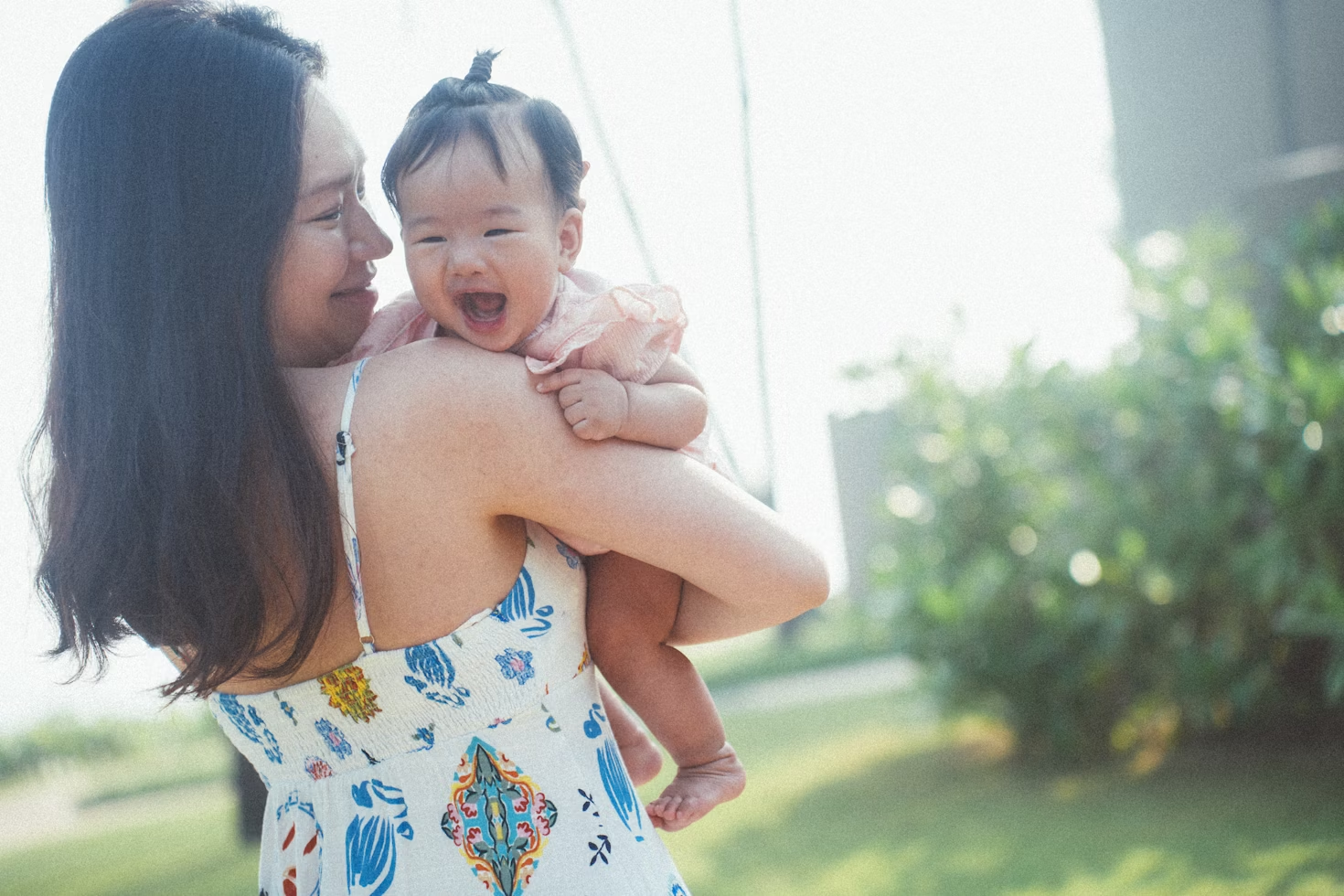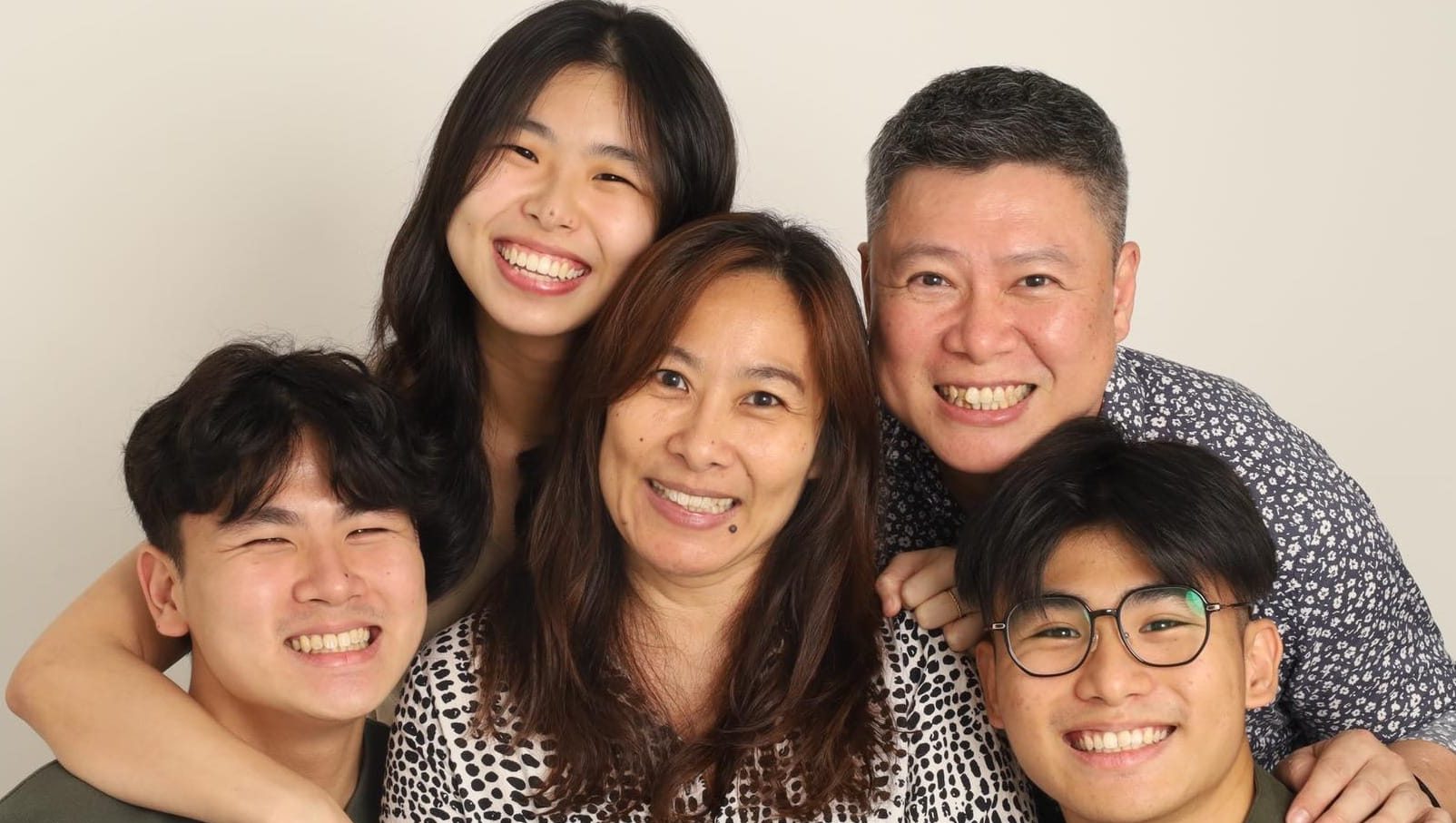“I could not do this alone. But with God, I had peace”: Wife who got Covid at 38 weeks pregnant
Priscilla Goy // December 21, 2021, 2:19 am
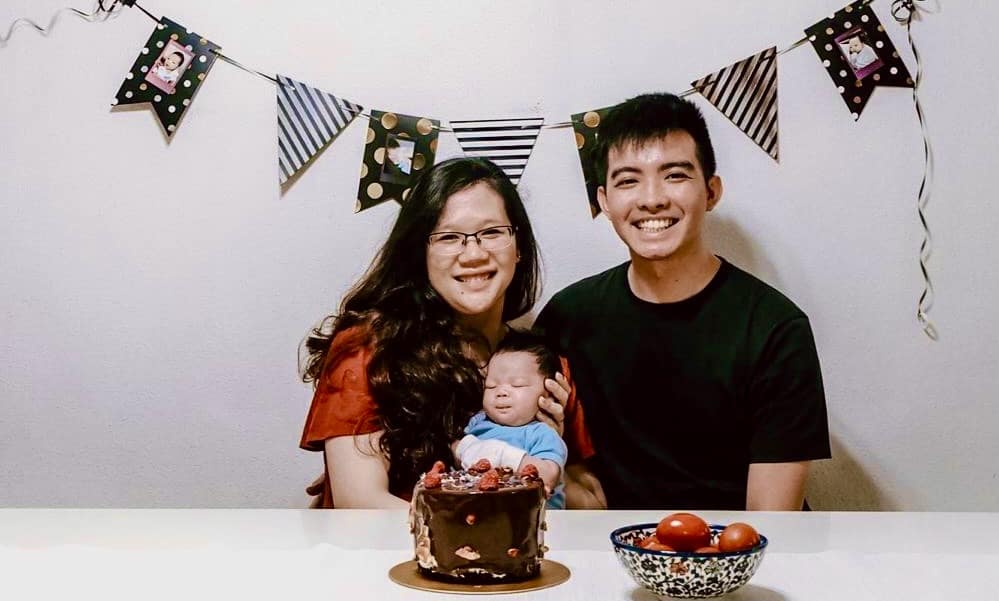
Despite the uncertainties, the couple stayed thankful and at peace throughout Shermaine's pregnancy. All photos courtesy of Shermaine and Jason Lee.
For more than six months into her pregnancy this year, Shermaine Vong-Lee was not vaccinated and spent 2.5 hours of commute each weekday, from her home in Hillview to her pre-school workplace in Punggol and back. All this while, she did not get infected with Covid-19.
And yet, on October 21, having been fully vaccinated, and having worked from home for about three weeks as her employer allowed her to do so, she developed a runny nose and tested positive on the ART test.
“My first reaction was, ‘How did she get it?’”
This was less than two weeks to her expected delivery date of November 2.
“My first reaction was, ‘How did she get it?’” said her husband, Jason. He and his wife are both aged 25.
“She was unvaccinated and in a high-risk environment for seven months, and she was fine throughout. Then in the three weeks before she was Covid-positive, she was at home and vaccinated and didn’t really go out, yet she got Covid.”
She had also done an ART test three days before, as part of routine testing as a preschool teacher, and the result was negative. Till today, the couple does not know how she picked up the virus.
Shaken and worried
“I was shaking when I saw the second line (which indicated a positive result),” said Shermaine, who recently shared with CNA Women her experience of getting Covid-19 at 38 weeks pregnant.
They “double- and triple-checked” with more ART tests and the results still came back positive.
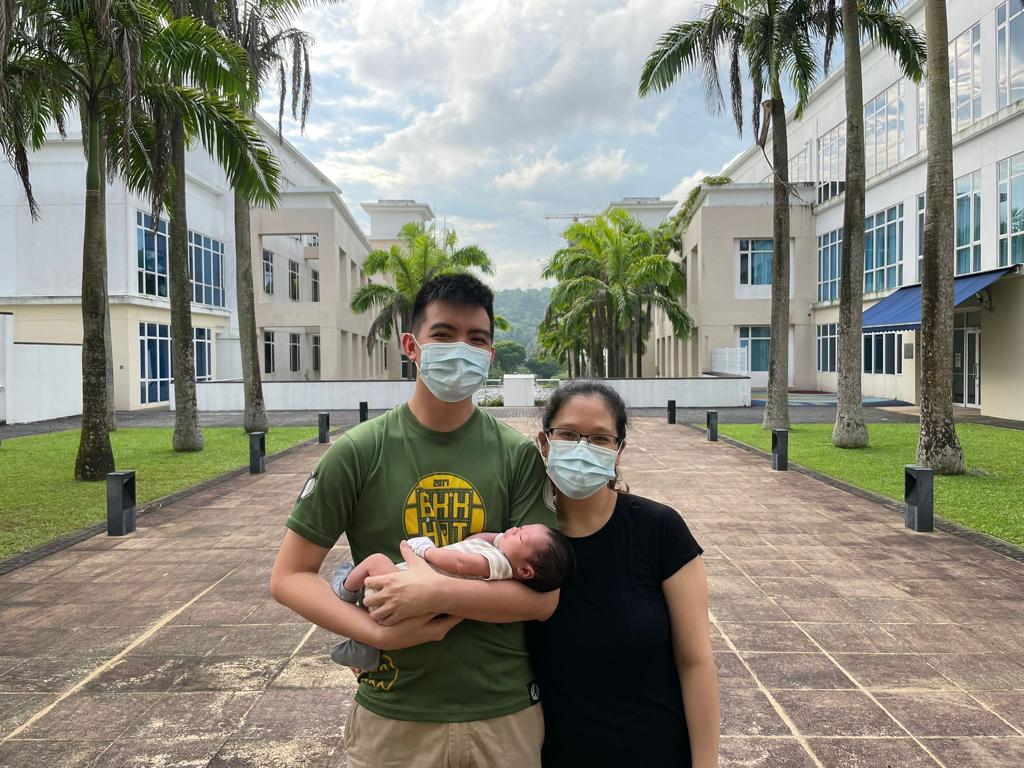
Shermaine and Jason back at home with their newborn son Nathan on November 15.
Their neighbours – the couple lives in Trinity Theological College (TTC), where Jason is pursuing a theological degree – prayed for them. Their parents got on a Zoom call with them and the family prayed together.
“I was worried that I’d be that one person to infect the school.”
“That night was tough. I didn’t know much about the statistics or possibility of Covid being transmitted to my child. I was just crying myself to sleep and asking God to please protect my baby,” said Shermaine.
The couple also worried about the safety of the people they had interacted with in the days prior, including a neighbour who was also pregnant. Over the next few days, as more possible names came to mind, they informed more people of their situation.
While Shermaine worried about infecting her husband, he worried about infecting TTC. Most of the classes were held online, but given the small size of the school and the proximity, “if someone were to get infected, it could be quite easy for others to get it and for a cluster to develop,” said Jason.
“I was worried that Covid could spread throughout the school, which had been trying to play it safe already, and worried that I’d be that one person to infect the school.”
Feeling peace
On October 22, Shermaine got a PCR test done and she received a positive result the next day. By then, the couple had done some research and sought advice from their cell leader, who is a doctor.
“Thank God, we had a lot of peace.”
They learnt that the risk of transmission from pregnant mother to the foetus is low, at about 1 to 4%, according to a Straits Times news article. They felt the percentage would not spike even with the more contagious Delta variant, given that Shermaine was vaccinated. Their cell leader also told the couple it was unlikely for the virus to be transmitted to their baby.
“By then, I was quite chill already, and we thought of just letting it pass,” said Jason.
“Thank God, we had a lot of peace,” Shermaine added. “People were going, ‘Oh my gosh, are you okay?’ but by then both of us were like, ‘Yup okay, can.’”
Being separated from each other was tough for both individuals though, even though this reduced the chances of Shermaine infecting Jason.
Separated and alone
Shermaine didn’t qualify for home recovery as she was more than 26 weeks pregnant, so on the night of October 23, an ambulance came and she was sent to KK Women’s and Children’s Hospital (KKH).
She had only about 30 minutes’ notice before the ambulance came. “So I had to quickly pack my things and shower, then go already. We didn’t really have much time to be mentally prepared,” she said.
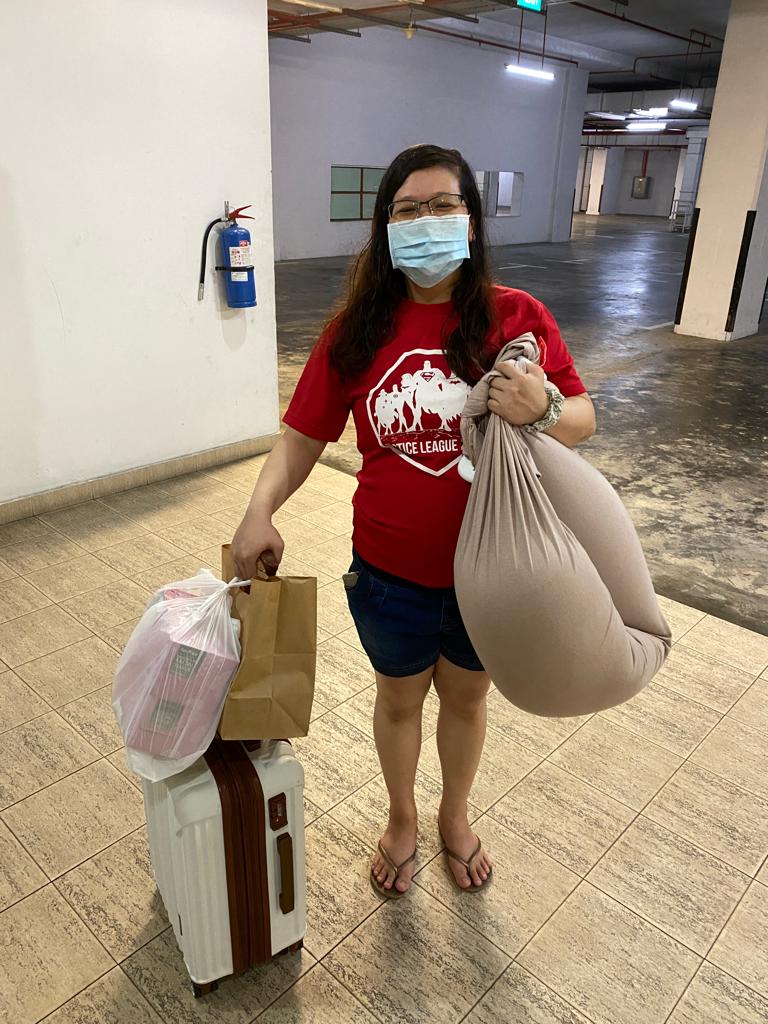
Shermaine had just 20 minutes to gather some creature comforts before boarding the ambulance for KKH.
Jason added: “It was our first time being separated from each other since getting married in June last year.
“The situation only felt more real after she left. And she left in an ambulance, not a GrabCar or something.
“When I saw the ambulance leave the car park, that’s when I thought, ‘Okay, Shermaine has Covid. There’s a possibility that she may be isolated until she gives birth alone. And I’ve to deal with disinfecting the house.’”
Going back to an empty house felt a bit lonely, he added. He also could not sleep well. For a few nights, he had to sleep on the floor in the living room, as it was recommended for him to isolate himself from the bedroom where Shermaine had slept.
It was also hard when he moved back to their bed to sleep. “Shermaine wasn’t there, and there wasn’t anyone to talk to and fall asleep together with. The nights were quite difficult.”
In the hospital
At KKH, Shermaine was in a ward with four other patients – all mothers who were more than 26 weeks’ pregnant and infected with Covid-19. Apart from three daily visits from hospital staff, she said the patients hardly spoke to one another.
“In that sense, it was very lonely because you have nobody to talk to, no friends, no support system in the ward itself. My only interaction with people was with the nurse, and with friends and family over video and phone calls.”
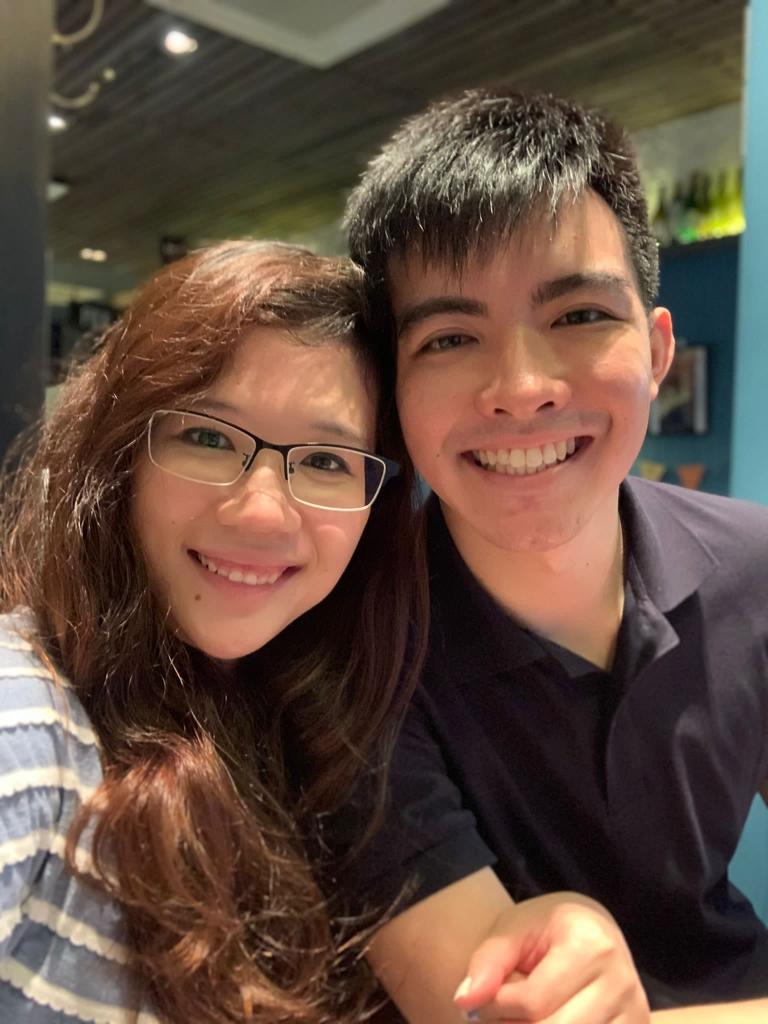
The separation while Shermaine was in hospital was not easy for the couple, as it was the first time they had been separated since getting married in June last year.
At times, she could hear conversations that nurses had with other patients, and she knew some patients had been in the ward for eight days or longer. “They were super sian already. They just wanted to go home, so they don’t really bother about making small talk.”
“There have been past instances in our lives where things didn’t go according to plan, but God still provided.”
Over the six days that she was in hospital, apart from conversations with her family and friends, she spent time sleeping, reading, watching shows on her laptop, and walking in the small space around her bed.
She also learnt that she would be given a PCR test on the sixth day of being Covid-positive, and that she could go home if given the all-clear.
“I was counting down the days, but also preparing myself mentally that I may not test favourably and may not be discharged. I wanted to be hopeful, but I didn’t want to psych myself up and then, in the end, not be able to go home early,” said Shermaine.
“I was praying for strength to not worry too much, and to be strong for (my son) Nathan too. My ideal situation would be to go through the delivery with Jason, but if God has other plans, I’d try to be okay with it.
“There have been past instances in our lives where things didn’t go according to plan, but God still provided. God was still faithful, and I had to keep reminding myself that, even though things don’t turn out the way I planned, God will provide and everything will be okay.”
“What if’s” and “if’s”
During her time in hospital, she was also encouraged by the song The Summons.
“I was reminded that I just have to follow God’s direction.”
“It’s a song about following God’s direction and it poses the question: ‘If God summons you to go, will you follow Him? Will you go where you don’t know and never be the same?’
“So I was reminded that I just have to follow God’s direction.”
Ecclesiastes 4:12, which says, “A cord of three strands is not easily broken”, also spoke to her.
“I cannot do this alone, Jason and I cannot do this alone, but with God, it’s easier and there’s a lot of peace.”
Meanwhile, while Shermaine was in KKH, Jason was thinking of various “worst-case scenarios”.
“What if Shermaine gets a very bad case of the virus? What if, for some reason, she miscarries?
“But I felt that, like Job in the Bible, who was I to question God and demand that Nathan and Shermaine must be okay?”
Sharing encouragement instead of spreading fear
During this ordeal, some of the couple’s friends helped in practical ways, offering to send them food and groceries. Jason’s mother cooked food that his father delivered to Shermaine in the hospital. Some friends texted once or twice a day, “not texting too much”, to ask how they were doing, said Jason.
Along the way, news about Shermaine’s Covid-19 infection was shared with dozens more people than those whom the couple had shared with, and this was done without getting their consent. While this meant that more people could pray for them, it also led to more people texting the couple and asking similar questions.
Along the way, news about Shermaine’s Covid-19 infection was shared with dozens more people.
“At that time, we were quite at peace with the situation, also because Shermaine’s symptoms were mild,” said Jason. “But with many people texting us, it felt like it became a ‘big thing’.”
Shermaine added: “To us, it wasn’t a big thing, and we also wanted to try to keep it that way.”
It did not help when friends said words such as “it must have been very stressful” and “you must be very worried”, as the couple did not feel that way. They would then have to explain why they were not stressed, explain the low risk of transmission from mother to child, and Shermaine’s mild symptoms.
“That was also not helping me to trust God,” admitted Jason.
“I would have appreciated it if they asked how I was feeling, rather than they presume, because how you feel about the situation may not be how someone else feels about it. For people who asked how I felt, then bounced off my response, that was an enjoyable conversation.”
Trusting in God’s faithful provision
Shermaine was discharged on October 27 and was at home for a few days before the couple’s son Nathan was born on October 31.
Despite their brush with Covid-19, the couple is thankful to God.
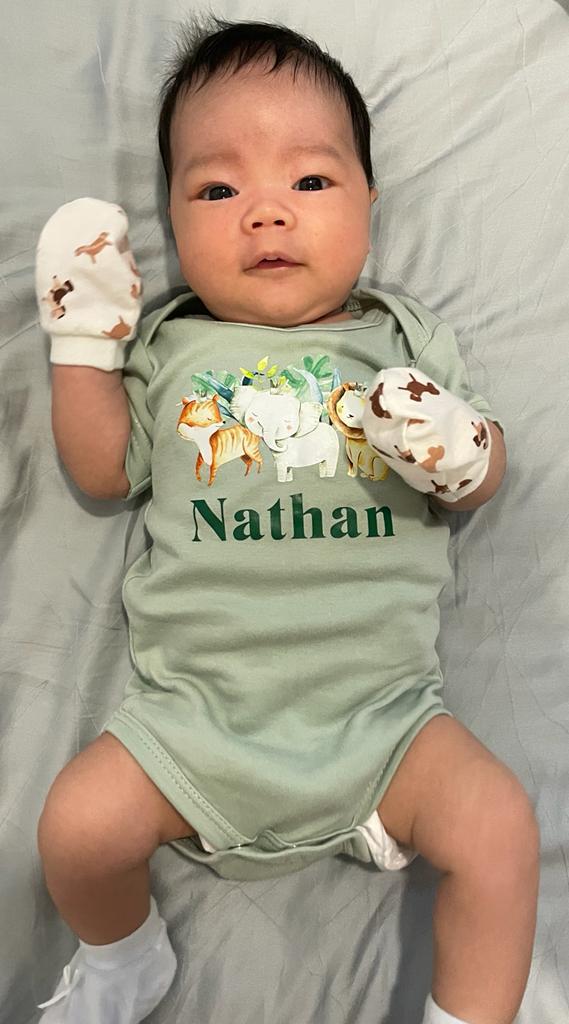
Nathan was born a healthy baby, to the delight of the couple’s family and friends.
For one, they are thankful that Shermaine got vaccinated despite her initial hesitation for about two months. Citing the story of the drowning man, often told as a Christian parable, the couple said they see vaccination as one of the ways offered by God to protect people against Covid-19.
In the story, a Christian man in a flood refuses three offers by various people to rescue him, each time telling them that God will save him. In the end, he drowns and meets God in heaven, where the man asks God why He did not rescue him. God replies that He had sent three groups of rescuers to help him but he did not allow himself to be rescued.
“Without God, it could sound like a very big deal, a very chaotic situation. But with the peace of God, we were okay with it.”
“I’m not trying to make a case for people to get vaccinated, but the real implication for us has been that Shermaine had milder symptoms and Nathan also got protected against Covid-19,” said Jason. Research has shown that pregnant women who get an mRNA vaccine against the virus pass high levels of protective antibodies on to their babies.
He is also thankful about the timing of her infection.
If she had been infected earlier, when restrictions were tighter, he would have been on home quarantine. Instead, he could still leave home to get food and groceries, so long as he tested negative before heading out.
If she had been infected later, she would likely have had to stay in the hospital with Nathan after his birth, and Jason would only have been able to see mother and child in person after they were discharged.
During her hospitalisation, Shermaine also grew to focus more on asking God, “What’s next?” instead of “Why?”
She sought to understand God’s leading and how He would show His faithfulness, rather than having thoughts of “Oh my gosh, what now?”
“Without all the ‘Christian aspects’, without God, what has happened could sound like a very big deal, a very chaotic situation. But with the peace of God, we were okay with it and we were trusting God,” she said.
“It has strengthened our faith in Him.”
RELATED STORIES:
Business down by up to 97%, yet these restaurant owners are still giving to the community
We are an independent, non-profit organisation that relies on the generosity of our readers, such as yourself, to continue serving the kingdom. Every dollar donated goes directly back into our editorial coverage.
Would you consider partnering with us in our kingdom work by supporting us financially, either as a one-off donation, or a recurring pledge?
Support Salt&Light
